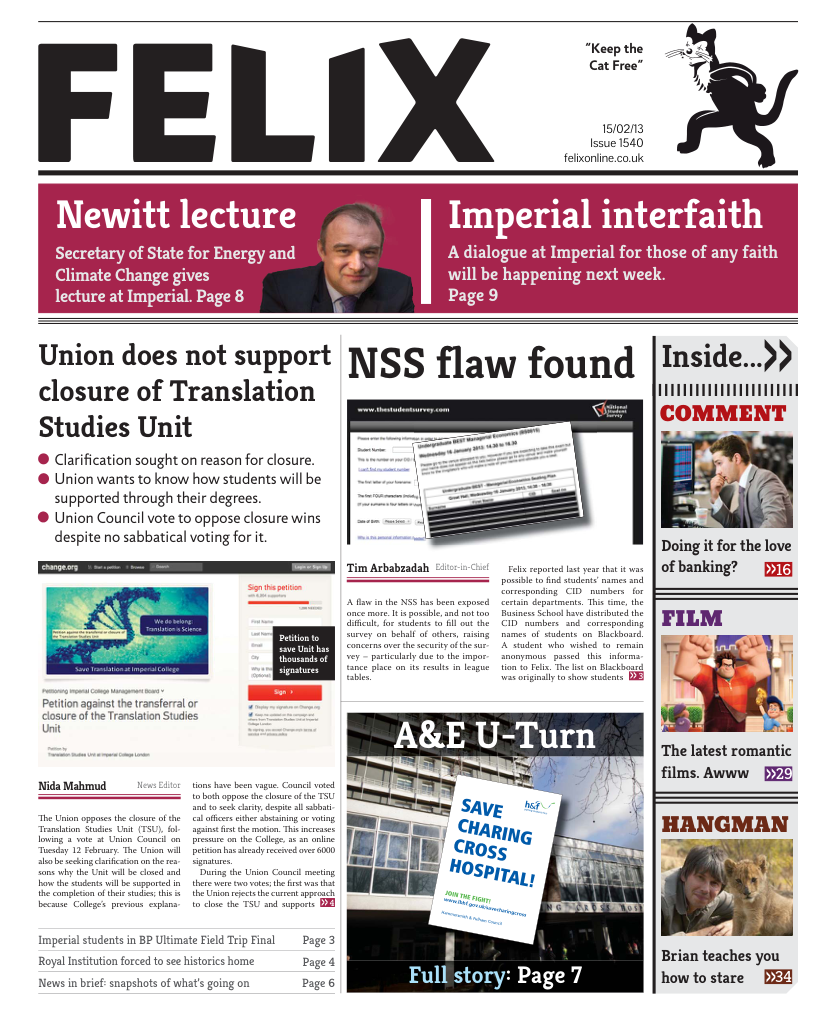Dr. Strangelove: or why I just really love finance, not salary
Ross Gray provides a retort to last week’s article about banking

Following last week’s article in Felix, and what I perceive to be a generally anti-finance attitude amongst Imperial undergraduates – you may think said attitude doesn’t exist, but I can assure you I have had to defend my career choices many times – I decided to take it upon myself to fight the corner of investment banking. If you’ve never read Leveraged Sell Out, this will probably be the most pro-banking piece you’ve ever encountered.
To me, the draw to finance was never really about money. I do agree with Billing’s points about the culture, but I think it’s painted a little too extreme. My own experience within investment banking is that while this culture of excess and living far outside your means exists, it’s certainly not the case for everybody. I would say that far from people being ridiculed for frugality as you might imagine would happen, the most irresponsible spenders are sometimes viewed in a negative light by some of their colleagues. Sure, there’s a lot of money flying around, but in the places I know well, I can’t think of a single person who is 10x leveraged. I have to admit that this is likely to be more common in the senior ranks, as people try to maintain their three cars, huge rent payments, private school for their kids and so on, but certainly for the analysts (who make up most of the ‘culture’ of the firm you’ll really see as an intern or recent graduate), even 0.2-0.3x leverage would be quite extreme. Many do start hitting the credit cards as bonus season approaches, which is obviously a dreadful idea from the viewpoint of fiscal responsibility, but this is usually as bad as it gets. The big spenders live lavishly, but within their (substantial) means.
Regardless of this, I do not believe anyone who will end upgetting a return offer from their internship, or more definitively, not get axed in their first two years, is driven solely by money. When you realise at 3am that all the assumptions driving your model are wrong and that it’s pretty unlikely you’re going to sleep tonight, it’s not the thought of that bonus in a year that keeps you going. It’s a passion for what you do, and the huge sense of responsibility on your shoulders.
One of the strongest reasons for me to pursue a career in investment banking is the sheer level of responsibility given to an analyst. Let’s face it, in every graduate scheme you’re going to be doing the most boring work in the organisation for at least two or three years; as far as I’m aware, there’s no magical job that lets you immediately start running accounts or deals, or making important decisions (except your own business of course). The difference between banking and some of these other jobs is that while you may be the bottom of the ladder, and occasionally feel underappreciated, you’re still absolutely key to the deal. It’s likely that you built the valuation (an important part of the service offered in investment banking) completely from scratch with little help or outside intervention and nobody, not even the people more senior than you, understands it as well as you do. You might be doing the Excel work instead of brokering the deal and being involved in high pressure negotiations, but this work is still absolutely critical to the deal closing. If your model is wrong somehow on a live deal, this could not only lead to the complete collapse of the deal but potential lawsuits and scandals. I can’t think of many other career paths where someone could derail a transaction worth billions of dollars in their first year.
When you realise at 3am... that it’s pretty unlikely you’re going to sleep tonight, it’s not the thought of that bonus in a year that keeps you going
I think a common problem for those trying to consider the mindset of those of us who choose this career path is that they don’t understand that to us, this is not boring. I can’t speak for every undergraduate with an internship, but I can assure you, mergers and acquisitions, leveraged buy outs, hostile takeovers and issues of corporate governance are infinitely more interesting to me than plasma physics or synthetic chemistry.
I didn’t have my heart set on physics then get to university and think “Wait, instead of doing something I love for not very much money, I can do something I absolutely despise for 100 hours a week for a good salary and a hefty bonus? Sign me up!” To me, the reasons to do banking seem analogous to those for coming to Imperial. Why did most people come here specifically, instead of, say, a slightly less respected university where they wouldn’t be worked to death? We want to learn as much as possible. We want the best exit opportunities afterwards. Why are we willing to work so intensely to achieve these goals? Perhaps it’s because regardless of where we’re going afterwards, most of us are still, or were at some stage, incredibly passionate about our subject. Perhaps we just love working hard in general. So next time you go to ridicule your friend for being a sell-out when they text you from their desk at 5am, think through why they might be there.
Nobody is claiming that finance is some magical land where you’ll be perpetually happy and there are no problems at all. Every path has its difficulties and its victories, and in finance these moments tend to be rather bipolar, with the worst moments being utterly dreadful, but the best moments being some of the most satisfying I have experienced. At the very core of it, that’s why, despite rarely leaving the office before 1am, being perpetually tired, often ill, and sometimes a little downtrodden, I still remain passionate about investment banking and look forward to starting my full time job in the summer. If you can’t understand this at all, then follow Mr. Billing’s advice: please do not go into finance, you will hate it. But if this means anything to you, if in some weird way you love it when you’re forced to pull an all-nighter for a lab report, then forget the money and put some serious consideration into a career in finance.








